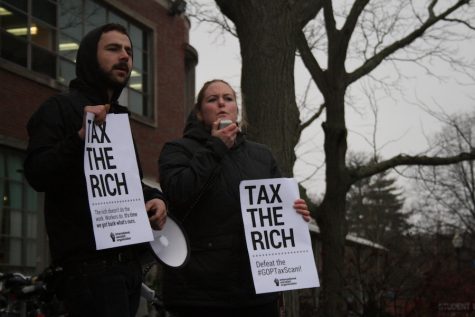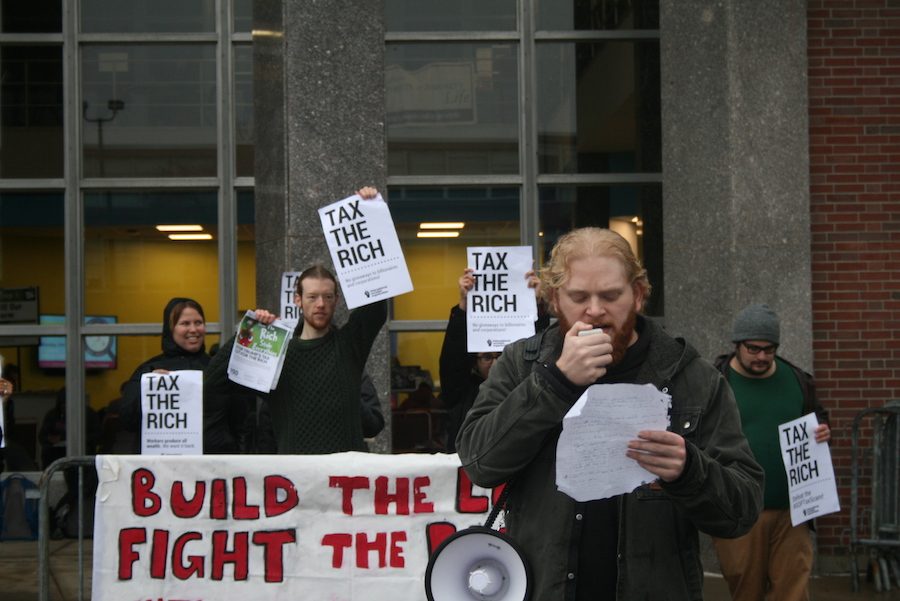UMass International Socialist Organization protest GOP tax bill
The protest comes amid recent developments that push the tax plan closer to becoming law.
December 7, 2017
AMHERST — As sprinkles of rain soaked their “Tax the Rich” signs, almost a dozen members of the University of Massachusetts Amherst International Socialist Organization held a rally outside the Student Union to protest the recent approval of the Republican federal tax plan in the U.S. Senate.
The rally took place on Wednesday at noon.
The tax plan is the largest change to the federal tax code in 30 years; big businesses in the US would pay a 20 percent rate in corporate taxes, as opposed to the current 35 percent rate. Individuals will see both a cut to taxes across the board and a removal of certain tax credits. The measure now needs to be reconciled with the House of Representatives version of the bill before it can be signed by President Trump.
“We called this rally because we think [the GOP’s tax plan] is an aggressive affront to not only democracy but working class power,” said ISO member and recent UMass alumna Stacey Sexton, who received her master’s in higher education in May.

2017 Hampshire College alumnus Jeffrey Kuhn (left), and UMass alumna Meghan Lemay (right), who graduated with a master’s degree in health policy and management, led chants such as, “How do we end the deficit? Tax tax, tax the rich!” Lemay has been a member of ISO for six years, and like a handful of other members, she has stuck with the group even after graduating UMass in 2013. (Brian Choquet/ Amherst Wire)
The House originally passed a tax bill on Nov. 16 that included a tax increase for graduate students who work an assistantship at their university. The most current iteration of the bill passed in the Senate no longer includes these provisions.
The House bill, however, did raise concern among graduate students across the country, leading to marches and walk-outs.
Most assistantships allow graduate students to work for their university in exchange for a stipend and waived tuition. The waived tuition would be counted toward the graduate student’s yearly income when filing taxes.
Through a megaphone, ISO member Dennis Kane, who graduated from UMass with a history degree, shouted “[The GOP’s tax plan] removes a tuition waiver for grad students that will cause thousands of dollars of extra taxes for grad students, forcing many out of grad school and creating graduate school as a place that only the rich can afford to go to.”
If the original House bill was to pass, an in-state UMass graduate student who is in an assistantship and taking 9 credits would have an estimated $13,210 added on to their yearly income when filing taxes.

Aster Richardson, a second-year public policy and administration graduate student at UMass Amherst, protested in the cold rain to show support for peers who would be affected by the bill. (Brian Choquet/ Amherst Wire)
Aster Richardson is a second-year public policy and administration graduate student at UMass, with an assistantship in the IT department. They will graduate in the spring. While the bill will not affect Richardson, they worry what impact it will have on peers who are still trying to pursue degrees.
“I really wouldn’t have come back to school at all if I hadn’t known there were opportunities for assistantships,” Richardson said. “The tuition waiver was critical.”
Massachusetts Daily Collegian op-ed columnist and UMass sophomore Brad Polumbo, whose conservative articles have garnered both backlash and praise, strongly believes the tax bill will provide economic growth to the American economy.
“This tax plan, while imperfect, is pro-growth and will expand the economy, raise living standards and boost wages. While it poses a problem to graduate students, taxing their tuition waivers will provide universities with an incentive to lower their obscene rates,” said Polumbo, an economics major. “They [the universities] will have to if they want to be able to continue to attract grad students competitively.”
The Senate’s revised tax bill now waits to go through reconciliation with the House, where a final bill will have to be signed by President Trump to become a law.
This article has been updated to correct the spelling of a name and the use of pronouns.
Email Brian at [email protected] or follow him on Twitter @brianshowket.

